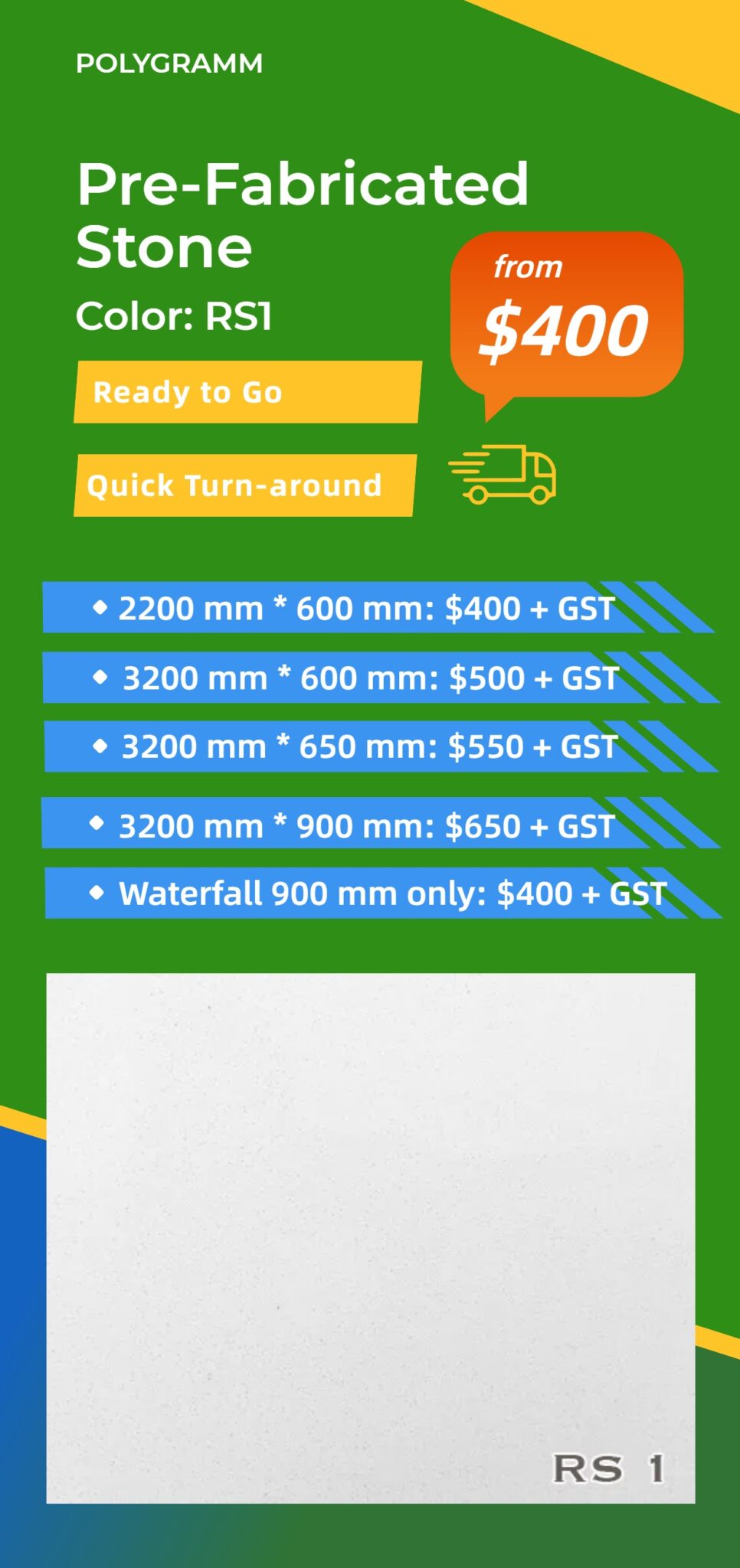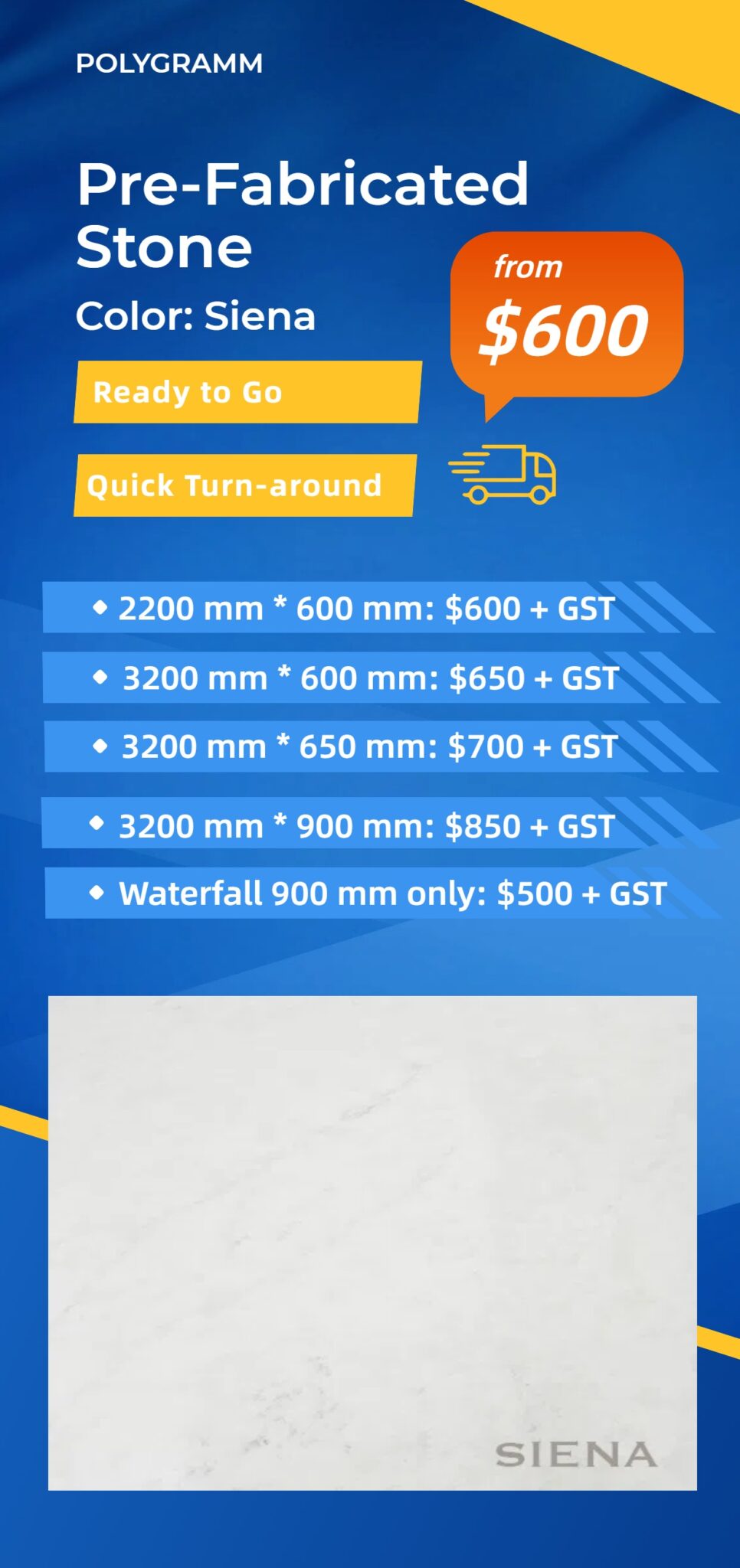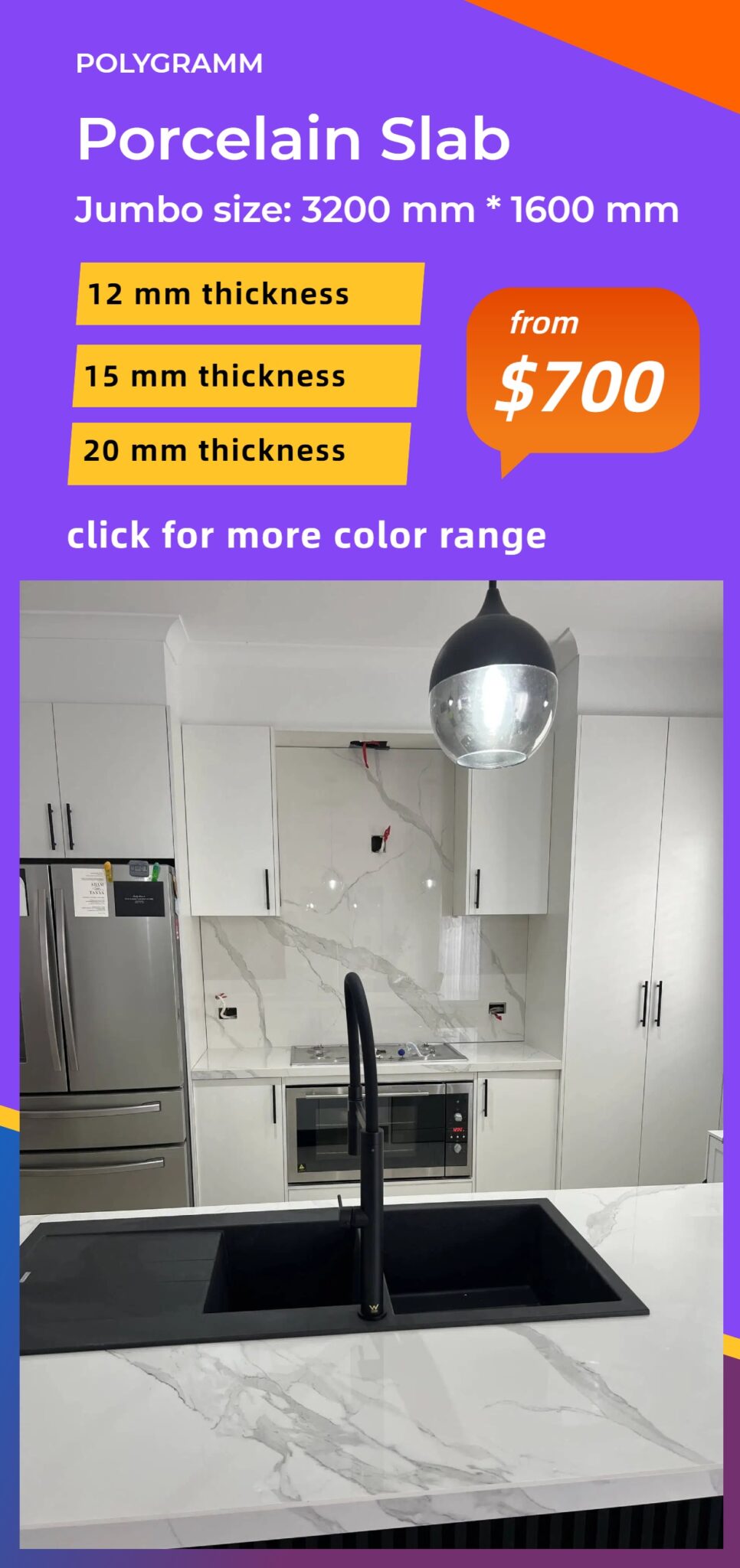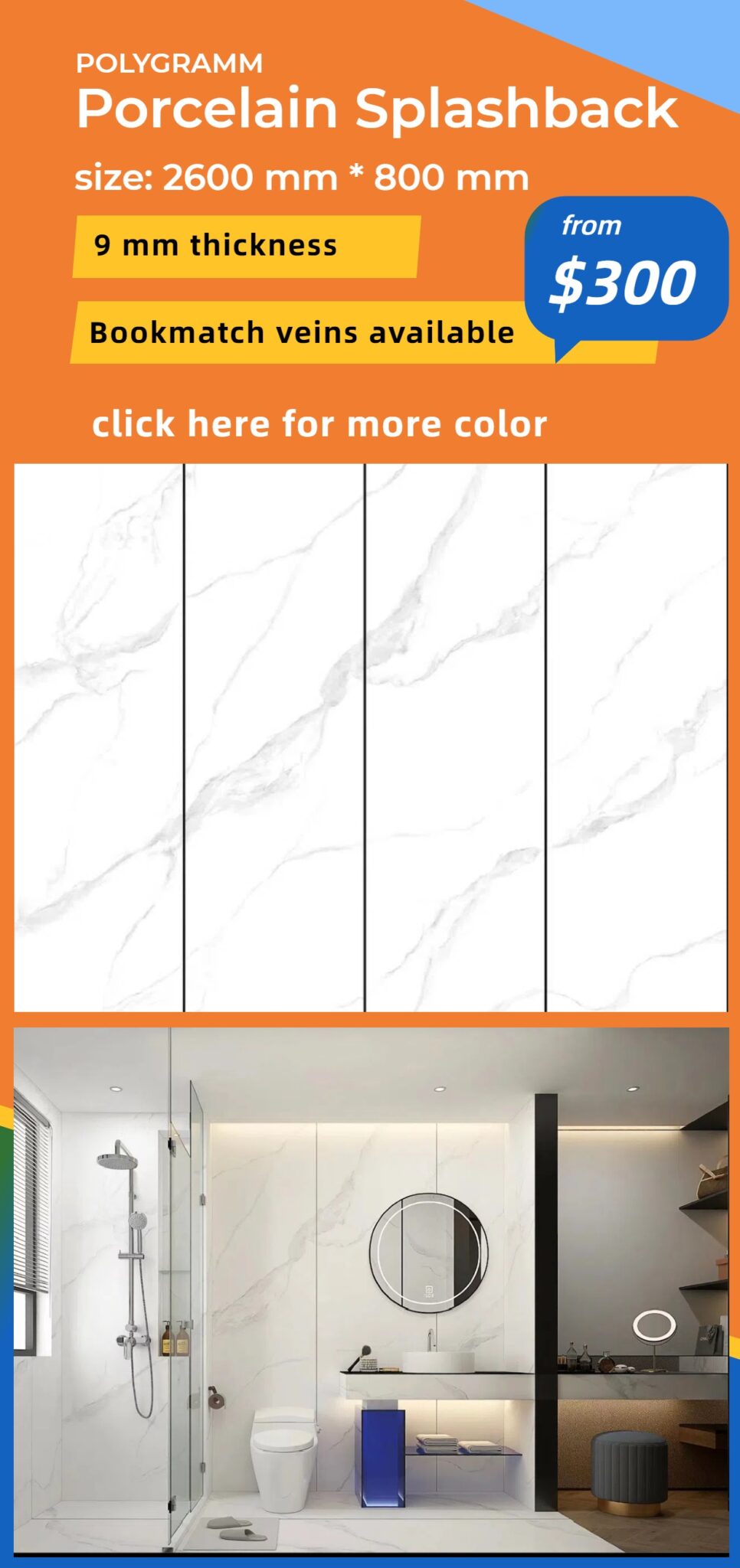-
Melbourne Kitchen Renovations
One Stop Shop
Affordable & Hassle-Free
Melbourne’s Best Value in Custom Made Kitchen Cabinets, Stone Benchtops & Porcelain Splashbacks
Welcome to POLYGRAMM / a fully integrated stonemason factory, cabinet making facility, and direct importer
Where Quality Meets Affordability.
- At POLYGRAMM, we believe that a beautiful, functional kitchen shouldn’t come with an overwhelming price tag. That’s why we’ve built our reputation in Melbourne on delivering exceptional value without cutting corners.
- Whether you’re updating your kitchen cabinets, replacing your stone benchtops, or adding a porcelain splashback, we provide high-quality materials and custom solutions at prices that make sense for everyday homeowners.
- Our mission is to make kitchen renovations accessible and affordable for more families—without sacrificing the craftsmanship, aesthetics, or long-term durability you expect.
- We take the time to understand your goals, budget, and lifestyle needs, then offer tailored recommendations to maximize value and minimize unnecessary costs.
- Because we manage our own supply chains and work with efficient processes, we’re able to pass those savings directly on to you.
- At POLYGRAMM, quality and affordability go hand in hand. We help you create the kitchen you’ve always wanted—beautiful, durable, and budget-friendly—without the stress or inflated quotes.
Save Thousands on Your Kitchen Makeover
Why overpay for your dream kitchen? We cut out the middlemen to pass the savings directly to you. Our streamlined process ensures you get the best materials at unbeatable prices. At POLYGRAMM, we offer factory-direct pricing on:
-
Custom-Made Kitchen Cabinets
Designed to Fit Your Space, Style & Budget – Without the Hefty Price Tag
-
Premium Pre-fab Stone Benchtops
High-End Look, Fast Turnaround, and Big Savings – Ready to Install in Days
-
Designer Porcelain Splashbacks
Sleek, Stylish & Easy to Maintain – The Perfect Finish for Any Modern Kitchen
10+ years
transforming kitchens across Melbourne
5,000+ kitchens
renovated – and still counting
Honest Pricing– No Surprises
Renovating a kitchen can be stressful – but not with us.








What Our Customers Say
-
⭐⭐⭐⭐⭐
“The POLYGRAMM team made our kitchen renovation so easy and affordable. Highly recommend them!” – Emma, Glen Waverley -
⭐⭐⭐⭐⭐
“We’re blown away by the value for money. The whole team was professional and reliable.” – James, Point Cook -
⭐⭐⭐⭐⭐
“Our new kitchen is absolutely stunning. Thank you to the POLYGRAMM team for delivering such great work.” – Rita, Doncaster -
⭐⭐⭐⭐⭐
“Michael was fantastic to deal with—very knowledgeable and responsive.” – Peter, Caroline Springs -
⭐⭐⭐⭐⭐
“Smooth process from start to finish. The POLYGRAMM team really know what they’re doing.” – Michelle, Bentleigh -
⭐⭐⭐⭐⭐
“Great workmanship and excellent communication throughout. Michael helped us choose the perfect splashback.” – Sarah, Essendon -
⭐⭐⭐⭐⭐
“The stone benchtop looks incredible. Big thanks to the whole team for a flawless install.” – Darren, Box Hill -
⭐⭐⭐⭐⭐
“We appreciated the upfront quote—no surprises. The POLYGRAMM team was honest and professional.” – Lisa, Altona -
⭐⭐⭐⭐⭐
“Super happy with our kitchen. The team kept us informed every step of the way.” – Mark, Coburg -
⭐⭐⭐⭐⭐
“Fast, clean, and on budget. Mel made sure everything ran on time.” – Anna, Preston -
⭐⭐⭐⭐⭐
“The POLYGRAMM team delivered exactly what they promised. Fantastic job!” – Tom, Reservoir -
⭐⭐⭐⭐⭐
“Very happy with the quality and finish. Michael was easy to work with and very helpful.” – Chloe, St Kilda -
⭐⭐⭐⭐⭐
“Can’t fault them—top-notch service and a beautiful result. Thank you POLYGRAMM!” – Simon, Moonee Ponds -
⭐⭐⭐⭐⭐
“We love our new kitchen. The POLYGRAMM team were efficient, friendly, and delivered great value.” – Fiona, Burwood -
⭐⭐⭐⭐⭐
“Michael and the crew made the whole renovation feel effortless. Highly professional.” – Jason, Cranbourne -
⭐⭐⭐⭐⭐
“The POLYGRAMM team exceeded our expectations. Great attention to detail.” – Helen, Sunshine -
⭐⭐⭐⭐⭐
“Mel gave us great design ideas, and the team brought them to life beautifully.” – Rachel, Footscray -
⭐⭐⭐⭐⭐
“Fantastic service and great product quality. We’ll be recommending POLYGRAMM to friends and family.” – Ben, Richmond -
⭐⭐⭐⭐⭐
“Our kitchen turned out better than we imagined. Big thanks to the whole team!” – Natalie, Thomastown -
⭐⭐⭐⭐⭐
“Everything was handled so professionally. We really appreciated the team’s honesty and care.” – Leo, Heidelberg -
⭐⭐⭐⭐⭐
“So impressed with how quickly and smoothly the install was done. POLYGRAMM are the real deal.” – Joanne, Werribee -
⭐⭐⭐⭐⭐
“David kept us updated the whole time. Couldn’t have asked for better service.” – Kevin, Noble Park -
⭐⭐⭐⭐⭐
“POLYGRAMM helped us stick to our budget without compromising on quality. Really happy with the outcome.” – Mia, Oakleigh -
⭐⭐⭐⭐⭐
“The team were friendly, fast, and professional. Our kitchen now feels brand new!” – Andrew, Mill Park